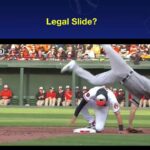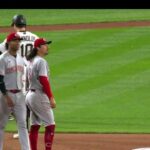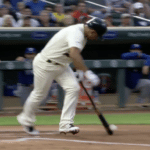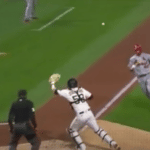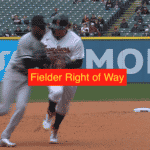WILLFUL AND DELIBERATE INTERFERENCE
Rules 6.01(a)(5-7), 5.09(a)(13), 5.09(b)(3), 6.01(j):
Rules 6.01(a)(6) and 6.01(a)(7) were added to the Official Baseball Rules to add an additional penalty when a base runner or a batter-runner deliberately and intentionally interferes with a batted ball or a fielder in the act of fielding a batted ball to deprive the defensive team of an opportunity to complete a possible double play. Keep in mind the rules provide that the runner or batter-runner must interfere with the obvious attempt to break up a double play.
Rule 5.09(a)(13) was added to the Official Baseball Rules “to penalize the offensive team for deliberate, unwarranted, unsportsmanlike action by the runner in leaving the baseline for the obvious purpose of crashing the pivot man on a double play rather than trying to reach the base.”
If, in the judgment of the umpire, a runner willfully and deliberately interferes with a fielder attempting to catch a thrown ball or attempting to throw a ball with the obvious intent to deprive the defense of the opportunity to make a double play, the umpire shall declare the runner out for interference and shall also declare the batter-runner out for the interference of his teammate.
NOTE: A runner should not be called out for unintentional interference if he has contact with a legally occupied base when he inadvertently hinders the fielder. See Official Baseball Rule 6.01(a) Comment (Penalty for Interference) for cases when such interference by the runner is intentional while in contact with a legally occupied base.
GUIDELINES FOR ENFORCEMENT OF RULE 6.01(j) (SLIDE RULE)
Official Baseball Rule 6.01(j) should be interpreted in light of all of the Playing Rules that continue to govern runner interference. Thus, even in the absence of a bona fide slide, the umpire still must find that the conduct of the runner “interferes with, obstructs, impedes, hinders or confuses any fielder attempting to make a play.” See Definition of Terms (Interference). When a runner who does not engage in a bona fide slide makes contact with the fielder for the purpose of breaking up a double play, such contact will be deemed to have hindered and impeded” the fielder for purposes of interpreting Official Baseball Rule 6.01(j). However, there may be instances where the runner does not make contact—or makes only incidental or minimal contact—with the fielder. In such cases, the umpire will use his judgment to determine whether the runner “hindered and impeded” the fielder and thereby violated the Rule. In order to be considered an attempted double play, umpires should look for actions by the fielder associated with making a throw toward the next play, unless contact by the runner prohibits the fielder from making a throwing attempt. The fielder does not need to throw the ball for the umpire to call a violation of the rule, but he needs to demonstrate the intent to make a throw. The determination of whether there was an attempted double play must be made by the crew on the field. If there is no attempted double play then there cannot be a violation of the Official Baseball Rule 6.01(j). The umpire on the field may still call interference due to other elements of Official Baseball Rule 6.01, but those calls are not reviewable, and the umpires on the field should not permit the play to go to replay.
EXAMPLES:
(1) Bases loaded, no outs, ground ball to shortstop. Anticipating a double play, runner from second intentionally crashes into the shortstop and grabs him just as the shortstop is beginning a throw to second.
Ruling: Runner from second is guilty of willfully and deliberately interfering with a fielder with the obvious intent to deprive the defense of the opportunity to make a double play. The runner from second is declared out and so is the batterrunner. Runners return to first and third.
(2) Runners on first and third, no outs. Runner on first is stealing as batter hits a ground ball to shortstop. Anticipating a double play, runner from first intentionally rolls into and grabs the second baseman who is covering second and waiting for the throw from the shortstop.
Ruling: Runner on first has not made a “bona fide slide” because of his intentional actions to roll into and initiate contact with the fielder by throwing his arm to grab him. This is interference and the runner from first is declared out and so is the batter-runner. Runner returns to third.
(3) Bases loaded, no outs, ground ball to shortstop. The shortstop’s throw to second retires the runner from first. However, anticipating a double play, the runner from first intentionally slides out of the base line and crashes into the second baseman just as the second baseman is beginning a throw to first base. Runner is not able to reach second base with his hand or foot.
Ruling: Runner has not made a “bona fide slide” as he was not about to reach the base with his hand or foot and changed his pathway for the purpose of initiating contact with the fielder. Batter-runner is declared out for runner’s interference, and runners return to second and third. Note in this example that if the runner had not been ruled out at second (i.e., if the throw pulled the fielder off the bag) and the runner had still intentionally interfered in the manner described, both such runner and the batter-runner would be declared out.
(4) Runner on first, no outs. Batter hits a ground ball to the second baseman, who attempts to tag the runner. However, the runner, in the judgment of the umpire, intentionally tries to slap the ball out of the fielder’s glove, or tackles or grabs hold of the fielder so that the fielder is not able to make a play.
Ruling: The runner has willfully and deliberately interfered with a fielder with the obvious intent to prevent a double play. Runner from first is declared out and so is the batter-runner.
In interference plays of this nature, the umpire shall be governed by the intent of the base runner. If the umpire judges that the runner willfully and deliberately interfered with the obvious intent to deprive the defense of the opportunity to make a double play, the umpire shall declare both the runner and batter-runner out. If this is not the case, the umpire shall declare only the runner out. Note, however, that if the runner has already been put out, then the runner on whom the defense was attempting to make a play shall be declared out. See Official Baseball Rule 6.01(a)(5).

